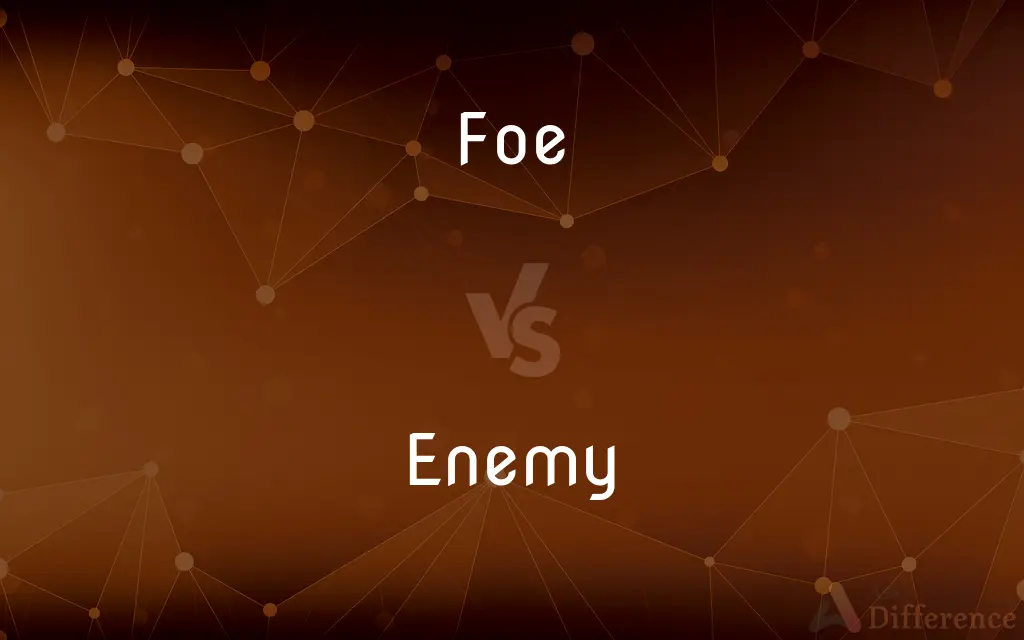Foe vs. Enemy — What's the Difference?
By Fiza Rafique & Urooj Arif — Updated on April 8, 2024
A foe is generally seen as an adversary or opponent, often in a broad or literary context, while an enemy is specifically opposed or harmful to someone, typically in a more personal or direct manner.

Difference Between Foe and Enemy
Table of Contents
ADVERTISEMENT
Key Differences
A foe is a term that often carries a formal or somewhat archaic tone, used to describe an opponent in conflicts that may be personal, political, or literary. Whereas an enemy is more directly associated with personal animosity or conflict. It is used in contexts ranging from personal relationships to international politics, denoting a party actively working against another's interests or well-being. An enemy's opposition is usually more direct and acknowledged by both parties involved.
The concept of a foe might encompass a wide range of opposition, from a rival in a competition to an opposing figure in a grand historical narrative. The opposition here does not always imply direct harm or malicious intent but a barrier to objectives or goals. On the other hand, the term enemy explicitly implies antagonism and often a threat to physical, emotional, or national security. The presence of an enemy suggests a more urgent and serious conflict requiring resolution to prevent harm or loss.
In literature and rhetoric, foes are often depicted with a degree of complexity and depth, sometimes even evoking empathy or understanding from the audience. This portrayal underscores the multifaceted nature of opposition, where respect and personal valor are significant. Conversely, enemies are frequently depicted as embodying negative qualities or representing harmful ideologies, with a clear moral divide established between them and the protagonist or positive values.
While a foe might be seen in a context that allows for eventual reconciliation or mutual respect following conflict resolution, enemies are typically characterized by a deeper, more irreconcilable division. This distinction highlights the perceived possibility of overcoming opposition with understanding or respect, as opposed to the enduring animosity expected with enemies.
The use of "foe" versus "enemy" can also signal the speaker or writer's attitude towards the conflict. Describing someone as a foe may suggest a more detached or philosophical perspective, whereas labeling someone as an enemy indicates a personal stake and a clear adversarial stance.
ADVERTISEMENT
Comparison Chart
Connotation
Formal, archaic; implies opposition with respect.
Direct antagonism; implies harm or threat.
Usage Context
Broad: personal, political, literary.
More specific: personal animosity, direct conflict.
Relationship
Opposition without direct harm; potential for respect.
Clear antagonism with potential for harm.
Portrayal
Complex, can evoke empathy; seen in literature.
Often negative, embodying harmful ideologies.
Reconciliation
Possible, with conflict resolution and mutual respect.
Less likely, due to deeper, irreconcilable division.
Compare with Definitions
Foe
Opposition in a competition or ideology.
In the debate, she found a formidable foe.
Enemy
Embodies negative qualities or ideologies.
Propaganda often depicts the enemy in a dehumanizing light.
Foe
Reflects a broader range of opposition.
The new policy faced foes on all sides.
Enemy
Someone who is actively hostile.
The soldiers were on alert for any sign of the enemy.
Foe
A rival or opponent, not necessarily evil.
In chess, each player views the other as a noble foe.
Enemy
Personal or direct opposition.
He considered anyone obstructing his goals as an enemy.
Foe
Can imply respect or valor.
Though foes, they shook hands after the duel.
Enemy
Represents a threat or harm.
In stories, heroes often face enemies threatening their homeland.
Foe
Used in historical or epic contexts.
The knight prepared to face his foes in battle.
Enemy
Involved in serious conflicts.
Diplomats worked to negotiate peace with the enemy.
Foe
An enemy or opponent
His work was praised by friends and foes alike
Enemy
An enemy or a foe is an individual or a group that is considered as forcefully adverse or threatening. The concept of an enemy has been observed to be "basic for both individuals and communities".
Foe
A personal enemy or opponent.
Enemy
One who feels hatred toward, intends injury to, or opposes another; a foe.
Foe
One who is opposed to an idea or cause
A foe of tax reform.
Enemy
One who opposes or is hostile to an idea or cause
An enemy of democracy.
Foe
An enemy in war.
Enemy
Something destructive or injurious in its effects
"Art hath an enemy called Ignorance" (Ben Jonson).
Foe
Something that is destructive or injurious
Taxes that were the foe of economic development.
Enemy
A hostile power or force, such as a nation.
Foe
(obsolete) Hostile.
Enemy
A member or unit of such a force.
Foe
An enemy.
Enemy
A group of foes or hostile forces. See Usage Note at collective noun.
Foe
A unit of energy equal to 1044 joules.
Enemy
Of, relating to, or being a hostile power or force.
Foe
One who entertains personal enmity, hatred, grudge, or malice, against another; an enemy.
A man's foes shall be they of his own household.
Enemy
Someone who is hostile to, feels hatred towards, opposes the interests of, or intends injury to someone else.
Under enemy duress
He made a lot of enemies after reducing the working hours in his department.
You may not want any enemies, but sometimes, your enemies choose you.
Foe
An enemy in war; a hostile army.
Enemy
A hostile force or nation; a fighting member of such a force or nation.
Rally together against a common enemy.
Foe
One who opposes on principle; an opponent; an adversary; an ill-wisher; as, a foe to religion.
A foe to received doctrines.
Enemy
Something harmful or threatening to another
Foe
To treat as an enemy.
Enemy
Of, by, relating to, or belonging to an enemy.
The building was destroyed by enemy bombing.
Foe
An armed adversary (especially a member of an opposing military force);
A soldier must be prepared to kill his enemies
Enemy
(video games) A non-player character that tries to harm the player.
Foe
A personal enemy;
They had been political foes for years
Enemy
To make an enemy of.
Enemy
One hostile to another; one who hates, and desires or attempts the injury of, another; a foe; an adversary; as, an enemy of or to a person; an enemy to truth, or to falsehood.
To all good he enemy was still.
I say unto you, Love your enemies.
It was difficult in such a country to track the enemy. It was impossible to drive him to bay.
Enemy
Hostile; inimical.
They . . . every day grow more enemy to God.
Enemy
An opposing military force;
The enemy attacked at dawn
Enemy
An armed adversary (especially a member of an opposing military force);
A soldier must be prepared to kill his enemies
Enemy
Any hostile group of people;
He viewed lawyers as the real enemy
Enemy
A personal enemy;
They had been political foes for years
Common Curiosities
Are enemies always harmful?
Typically, the term enemy implies an intent to harm or a threat to well-being, whether physically, emotionally, or ideologically.
How does an enemy differ from a foe?
An enemy is specifically someone who poses a direct threat or harm, with a more personal and antagonistic relationship.
Can a foe become a friend?
Yes, foes can become friends, especially if the opposition is based on competition or misunderstanding rather than deep-seated animosity.
Is it common to use 'foe' in everyday language?
'Foe' is less common in casual conversation and more often found in formal, literary, or epic contexts.
How do children understand the concept of enemies?
Children might view enemies in simplistic terms, often influenced by stories or media portraying clear-cut good vs. evil scenarios.
Can nations have foes instead of enemies?
In diplomatic or historical narratives, nations might refer to adversaries as foes, particularly when emphasizing respect or valor.
What defines a foe?
A foe is defined as an adversary or opponent, often with a sense of respect or valor attributed to the opposition.
What psychological impact does labeling someone an enemy have?
Labeling someone as an enemy can intensify feelings of animosity and justify aggressive or defensive actions against them.
Do sports rivalries create foes or enemies?
Sports rivalries typically create foes, as the competition is based on skill and respect rather than personal animosity.
Why might someone prefer to be called a foe rather than an enemy?
Being called a foe might imply a more respectful or valorous opposition, whereas 'enemy' suggests harmful intent.
Can misunderstandings create enemies?
Yes, misunderstandings can escalate conflicts and transform neutral or indifferent parties into perceived enemies.
What makes someone an enemy?
Active hostility, direct opposition, or actions that threaten someone's well-being make someone an enemy.
Does literature influence our perception of foes and enemies?
Yes, literature can significantly influence how we perceive and empathize with adversaries, often humanizing foes and vilifying enemies.
Can political parties be considered foes?
Yes, in the context of competition and ideological opposition, political parties can be considered foes.
Is it easier to reconcile with a foe or an enemy?
It's generally easier to reconcile with a foe due to the potential for respect and the less personal nature of the opposition.
Share Your Discovery

Previous Comparison
Noob vs. Nub
Next Comparison
Crepitus vs. CracklesAuthor Spotlight
Written by
Fiza RafiqueFiza Rafique is a skilled content writer at AskDifference.com, where she meticulously refines and enhances written pieces. Drawing from her vast editorial expertise, Fiza ensures clarity, accuracy, and precision in every article. Passionate about language, she continually seeks to elevate the quality of content for readers worldwide.
Co-written by
Urooj ArifUrooj is a skilled content writer at Ask Difference, known for her exceptional ability to simplify complex topics into engaging and informative content. With a passion for research and a flair for clear, concise writing, she consistently delivers articles that resonate with our diverse audience.













































